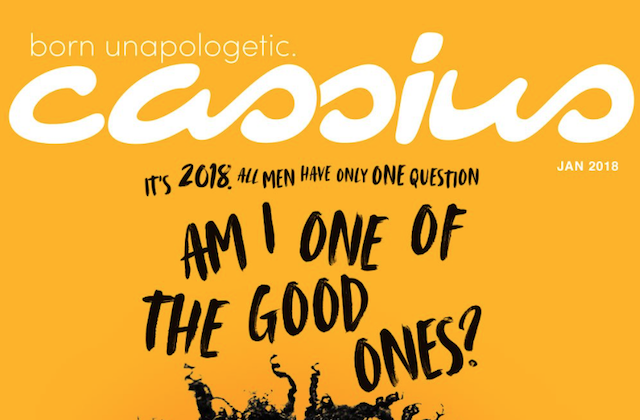The emergence of #MeToo opened doors not only for survivors of sexual violence to challenge the structures that silence their voices, but also for men to question how they are complicit in creating those structures. The team at Cassius, a Black culture-focused lifestyle outlet, faces those questions head-on in its January issue.
Amidst our current times of exposing incidents of sexual harassment, CASSIUS takes a look on what it means to be a "good man" in 2018 in our January cover: https://t.co/c4inDHeU6w #AmIOneOfTheGoodOnes pic.twitter.com/2XGF7tETMZ
— CASSIUS (@CassiusLife_) January 9, 2018
The articles and media that Cassius published yesterday (January 9) use the current moment to explore how Black men must challenge toxic masculinity. Editor at large Darnell L. Moore examines this socialization, rooted in White supremacy, in an essay on the mission of the package:
The rules of the game mandate that Black boys and men must shun our feelings and act as if we are anything but emoting, breathing, bleeding humans. Because that’s what the logic of White racism demands. It demands that Black men travel far away from our truest selves in a quest to become the hardened men we are expected to be.
[…]
We want to know what it means to be “a man” in a moment when manhood is rightly under fire. We want to know WTF manhood even means, if anything, and if it needs to be reimagined or abolished altogether.
Because enough is enough. Because it’s time for acts of calling in and accountability that end in transformation. Because it’s time to reflect on the ways our collective love for “masculinity” is like a tight ass grip choking brothers’ freedom, whether they have learned to breathe with hands around their necks or not.
Because we don’t want to publish another story about a Black man hurting a Black woman or man simply because he has yet to unpack the ways our culture of male-domination has hurt him. Because it’s not enough to feign virtue as one of the “good ones,” a good man/partner/son/friend/brother, when the “good” is, at best, a way of describing the ways we ought to be relating to our folks any-damn-way.
Moore also discusses this topic in a candid roundtable discussion with criminal justice reform activist Marlon Peterson, writer Yahdon Israel, and Cassius editors Rae Holliday and Cory Townes. Watch a video of their conversation at CassiusLife.com.
The cover also includes an essay by writer and scholar Kiese Laymon, titled “Am I One of the Good Ones?” in which he unpacks how he and other men who have anti-oppressive beliefs still perpetuate internalized toxic behavior:
I know I am one of the good ones because I predicted that as the face of American sexual violence morphed from a Jell-O Pudding Pop-eating, droopy-faced respectable Black man, to lipless powerful dudes the color of raw chicken, the country would predictably begin to consider what transformative justice for perpetrators of sexual violence actually looks like.
I know I am one of the good ones because I have (selectively) radical politics (even though I sometimes misgender my trans and gender-nonconforming students). I know I’m one of the good ones because I often say the words “queer” “cis” and “trans-antagonism” in casual conversation.
I know I am one of the good ones because I keep it so real (but only about stuff I am really comfortable keeping it so real about, and I have no idea what to do with the thin terrifying line between publicly reckoning with the ways I’ve emotionally abused Black women, and the possible re-traumatizing of harmed Black women that often come with these “GoodBlackMen” public reckonings).
In a nod to the fact that reversing this socialization requires self-healing, the Cassius team also published a complimentary series of articles addressing wellness habits.
Read the full cover package at CassiusLife.com.
